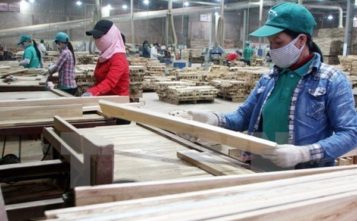A group of Indonesian wood product manufacturers is strongly opposed to the government's plan to resume log exports fearing this will result in a shortage of raw materials for local companies.
The chairman of the Indonesian Furniture and Handicraft Association (AMKRI – Assosiasi Mebel & Kerejinan Indonesia) Soenoto said logs contributed about 40 percent of the total production cost so a shortage leading to higher log costs would push up production costs significantly. He stressed that at the end of 2011 the export of raw rattan was banned to support local companies and that this resulted in a sharp increase in exports of rattan products.
Data from Sucofindo, an independent surveyor in Indonesia , shows that between January and March this year rattan product exports grew by around 30 percent year-on- year to US$48 million Indonesia's log export ban followed the massive outflows of logs between 1998 and 2001 when the export tax was sharply reduced and the ban has helped domestic industry.
While the proposal to lift the log export ban has met opposition from several ministries concerned on the impact on domestic manufacturers discussions on the issue continue. Industry minister Mohammad Suleman Hidayat, has revealed that timber companies in Papua are in favour of lifting the ban which, they say, is part of the reason why unempl oyment in the province is high.
Costs and shortage of assessors hindering SVLK implementation
At a recent gathering to discuss the implementation of Indonesia‟s timber legality assurance system (SVLK), Bibi Fatmawati of Yogya Indo Global exports said securing SVLK certification costs at least US$2,000 and that this bars many smaller enterprises from applying for certification.
Costs are one issue said WWF Indonesia's director of policy and transformation, Budi Wardhana, but the lack of a standard cost structure for the certification is another hurdle. He said the charges for SVLK assessment vary widely with no clear rationale for the various price structures.
According to Budi, the low number of SVLK assessors is also a stumbling block for the government as it pushes ahead with SVLK. Several analysts have said that Indonesian officials need to focus on developing consistent st andards for the SVLK and FLEGT - VPA, on capacity building for local officials and businesses and on developing a complete chain of accountability.







Leave a Reply